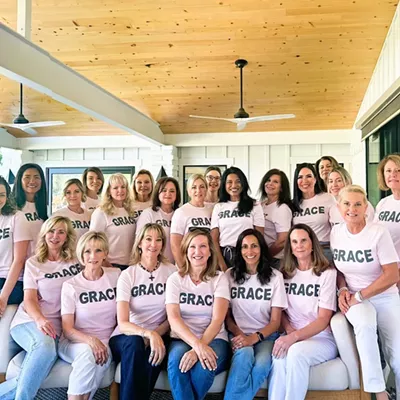White House spokesman Tony Snow summed up the conservative argument against using federal dollars when he told the press that Bush "believes strongly that for the purpose of research, it's inappropriate for the federal government to finance something that many people consider murder. He's one of them."
Supporters of more federal funding for stem-cell research, such as the American Association for the Advancement of Science, California Gov. Arnold Schwarzenegger and former First Lady Nancy Reagan, argue that it holds tremendous potential to find cures for such diseases as Parkinson's, Alzheimer's, multiple sclerosis, cancer and diabetes.
The federal government does fund stem-cell research--to the tune of roughly $608 million last year, according to the National Institute of Health. But only $39 million was spent on human embryonic stem-cell lines, with an additional $200 million on human non-embryonic cells. The rest went to non-human stem-cell research.
The vetoed legislation would have allowed additional research dollars to be spent on stem cells taken from embryos at fertility clinics, with the permission of the donors. An effort to overturn Bush's veto failed to get the required two-thirds majority in the House of Representatives last month.
So where do the Republicans vying to replace retiring Congressman Jim Kolbe stand on the restrictions? (For the record, Kolbe voted to lift 'em.)
Former state lawmaker Randy Graf says the research should not be funded by federal dollars.
"It's not eliminating embryonic stem-cell research," Graf says. "It's just making sure that taxpayer dollars are not going into it."
Mike Hellon, the one-time chair of the Arizona Republican Party, says "bogus" opposition to the research is standing in the way of vital medical research into devastating and fatal diseases.
"It is inconsistent to say it's OK to throw embryos in the trash, but it's not OK to harvest stem cells," Hellon says. "That's just a logical argument that makes no sense to me whatsoever. I think the pro-life people are pushing the envelope way too far on that."
State lawmaker Steve Huffman likewise supports easing the restrictions. "I lost my grandfather just a few months ago to Alzheimer's, and so I think it's absolutely critical that we not shut down any possible avenue to find a cure for some of these horrible diseases."
Frank Antenori, the former Green Beret who now works at Raytheon, doesn't think federal funds should be used for stem-cell research and wants safeguards in place to prevent the scientific community from sliding down a slippery slope of human cloning and body banking.
Auto-shop manager Mike Jenkins says he's opposed to federal funding for stem-cell research, because the money will be wasted.
"You keep the federal government out of it, and things will go a lot better," Jenkins says. "Anytime the federal government gets involved in something, it costs you twice as much for half the benefit."
In fact, Jenkins opposes federal funding for AIDS and cancer research for the same reason.
"I don't really think the federal government should be funding that stuff, either," Jenkins says. "All your tax dollars go in, and when they find a cure, they charge an arm and a leg for it, anyway."
The six Democrats seeking the CD8 seat all support federal funding for stem-cell research.
Patty Weiss, the former TV newscaster, says "stem-cell research is going to help dramatically for many central-nervous system disorders--not only mental-health issues, but people with Parkinson's, people with multiple sclerosis, people with heart disease."
Former state lawmaker Gabrielle Giffords says her grandmother suffered from Alzheimer's disease.
"I watched her slowly die with a disease that millions of Americans have, and millions of Americans will have," Giffords says. "These are diseases we can find cures for. If we place value on the lives of people we love, we ought to allow research to go forward in these areas as well."
Jeff Latas, an Air Force vet who now works as a commercial airline pilot, says watching his son battle leukemia has given him a firsthand look at the importance of stem-cell research.
"By vetoing to satisfy a very small sector of the conservative side of the Republican Party, essentially, you're signing a death warrant to millions of Americans," says Latas.
Raytheon employee and Tucson Unified School District board member Alex Rodriguez "absolutely" supports using federal funds for the research: "I see it as a missed opportunity. What do you do with all those cells anyway? They're going to be thrown out."
Retired federal bureaucrat Francine Shacter says the opposition to stem-cell research reflects the Bush administration's anti-science bent.
"I have lived on the outskirts of the scientific world my entire life," Shacter says. "One of the things I deplore about this administration is the dumbing down of science. ... There's a fundamental dishonesty there that disturbs me very badly."
Attorney Bill Johnson, who wants to drastically cut the federal budget, says he's "generally opposed to the expense of government, but research is an area that government could be involved."
So You Say You Want an Evolution
If you visit the Center for Scientific Creation Web site (www.creationscience.com), you'll learn that evolution is a lot of bunk. The Earth is "possibly less than 10,000 years old," the Grand Canyon was carved by the Great Flood, and Noah had dinosaurs on the ark. (The researcher notes that "some dinosaurs were semi-aquatic and could have survived outside the ark.")
Creationists complain that the scientific community tries to stifle that kind of argument with a materialistic worldview that embraces godless concepts such as evolution and uses various pieces of so-called evidence to postulate that the Earth is closer to 4.8 billion years old.
Granted, not all creationists buy into the "young-Earth theory." The Discovery Institute (www.discovery.org), for example, offers a much slicker package by dropping God--at least by that particular name--out of the question and leaving it in the hands of an "Intelligent Designer." Still, you could be forgiven for suspecting that the Discovery Institute was Christian-based if you came across a leaked 1998 memo that noted that the center "seeks nothing less than the overthrow of materialism and its cultural legacies. ... Discovery Institute Center ... wants to reverse the stifling dominance of the materialistic worldview and to replace it with a science consonant with Christian and theistic convictions."
Discovery Institute director and founder Bruce Chapman argues that the scientific community is split on the issue of whether the universe was guided by a supernatural intelligence, so science teachers should "teach the controversy"--an idea that's supported by such politicians as President Bush and U.S. Sen. John McCain.
A group of 38 Nobel laureates disagreed in a statement they released last year, which stated: "Logically derived from confirmable evidence, evolution is understood to be the result of an unguided, unplanned process of random variation and natural selection. As the foundation of modern biology, its indispensable role has been further strengthened by the capacity to study DNA. In contrast, intelligent design is fundamentally unscientific; it cannot be tested as scientific theory because its central conclusion is based on belief in the intervention of a supernatural agent."
The American people tend to lean in God's direction. In a 2005 CBS poll, 51 percent of Americans surveyed said they believed God created man in his current form. Another 30 percent said that humans evolved, but God guided the process. Just 15 percent believe that man evolved without divine intervention.
The GOP candidates split on whether creationism should be taught in science classrooms.
Antenori, who minored in biology, is against it. He dismisses the idea that the Earth is only 10,000 years old with a curt: "That's BS. I don't buy into that."
At the opposite end of the spectrum is Graf, who says creationist theory makes at least as much sense to him as evolution. "I think they can all be taught side by side and let students bring this information home and talk it over with their parents and determine how they're going to approach that," Graf says.
How old is the Earth? Graf is blunt: "I don't know, and I don't care. ... I've got my Christian faith, and I'm very comfortable with that."
Hellon, who suspects the Earth is more likely to be 4.8 billion years old, says that "creationism is a religious theory. It has no scientific basis whatsoever. I don't mind the teaching of it, but it shouldn't be taught as a scientific alternative."
Huffman is on the same page: "I don't think there's anything wrong in exposing people to different views and ideas, but I don't think it belongs in a science classroom, per se."
Jenkins falls back on the argument that because evolution is a theory, it has yet to be proved. He believes that any class that includes evolution should also include creationism.
Jenkins says that depending on how you count years, the Earth could simultaneously be 10,000 years old and 4.8 billion years old.
"I think you can combine the two," Jenkins says. "Being extreme in either way is bad. I think you have to look at it and say, this is possible. It could be 10,000 years, or it could be 10 billion years. Don't be absolute and finite. You have to look at this with a scientific mind."
All six of the Democrats seeking the congressional seat oppose teaching creationism in science classrooms and believe the Earth is closer to 4.8 billion years old.
Weiss says "creationism is religion. It should be taught in theology classes."
Giffords has "very strong religious beliefs, but I think that science should be taught in public schools."
Latas has "no problem with creationism being taught in school if it's in the proper place: theology class. Even though I don't claim to be a Christian, I am fairly spiritual. There are areas of our experience that we can't explain at this point scientifically."
That said, Latas adds: "You're gonna have a real hard time using the scientific method explaining to me how the Earth is only 10,000 years old."
Rodriguez says he believes "in the teaching of science based on the science and evolution, and issue of faith should be taught separately."
Shacter, who is firmly in the scientific camp, says "the theory of evolution is a pretty solid theory. I think there's enough evidence to support it. Why in the world should we dumb it down?"
Johnson says "creationism can be taught in Sunday school classrooms, but Monday through Friday, I don't think it should be taught."








